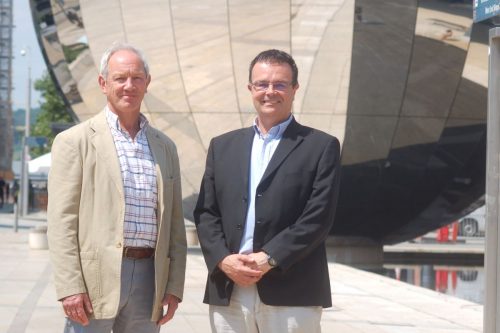Former military men launch business consultancy

Former military personnel have joined forces to improve effectiveness during uncertain times – potentially saving businesses hundreds and thousands of pounds.
Glen Maxwell-Heron and Felix Spender have set up Springboard to the Future (STTF), helping organisations develop a more productive and profitable workplace.
Glen, from Bristol, who worked as an engineer officer in the Royal Navy for over 10 years, said: “The world is moving and it’s important to adapt to stay relevant.
“But many organisations lose time, energy and money micromanaging and dealing with conflict rather than looking at the bigger picture.
“We help firms identify and resolve issues before they escalate, streamline processes and get teams to work more effectively. They can then focus on their vision and opportunities.”
Glen, who has worked for financial services businesses delivering multimillion pound IT projects, said they have helped organisations improve productivity and retention by at least 10 per cent.
The former University of Cambridge student said: “With small tweaks, we can make significant savings – and quickly.”
The aftermath of the COVID-19 pandemic, global conflict, the impact of climate change and the cost of living crisis has led to economic uncertainty.
The World Economic Forum’s global risks perception found the majority of respondents (54 per cent) anticipated some instability, while another 27 per cent expect greater turbulence.
And organisations must become more agile and collaborative if they are to respond to threats and opportunities.
Felix, a former army officer who has served with NATO in Iraq and Kosovo, said: “It’s important to manage internal conflict, which can have devastating effects. But it’s also vital we find ways to enhance collaboration and increase competitiveness.”
The duo work with a team towards a common aim – breaking down barriers and increasing a sense of ownership – which improves productivity.
Glen, who spent four years in Japan working for multinational companies and learned about their emphasis of advanced planning, said it was vital to prepare for a possible crisis.
He said: “It pays to recognise risks and respond to them quickly. Failure to do so can cost money and disrupt business.
“Disaster planning, such as in the case of earthquakes or incidents onboard a warship, can even save lives.
“It’s a common misconception that military life is about yelling orders. The team has to believe in the cause and what can be achieved – then they will sail in the same direction.”
But he highlights businesses can be disrupted by seemingly small incidents, such as an IT failure or the unavailability of someone with key knowledge.
He said: “Looking at potential points of failure and working out what you would do if something happens means you will be able to respond far more quickly and effectively.”
Felix, who joined the army at 18 and trained at Sandhurst, has helped SMEs ranging from defence contractors to engineering firms to law practices increase their productivity.
Felix, who secured the release of more than 100 hostages captured by Somalian pirates and ran a conflict management firm, added: “In these uncertain times, businesses need to be as effective as possible








